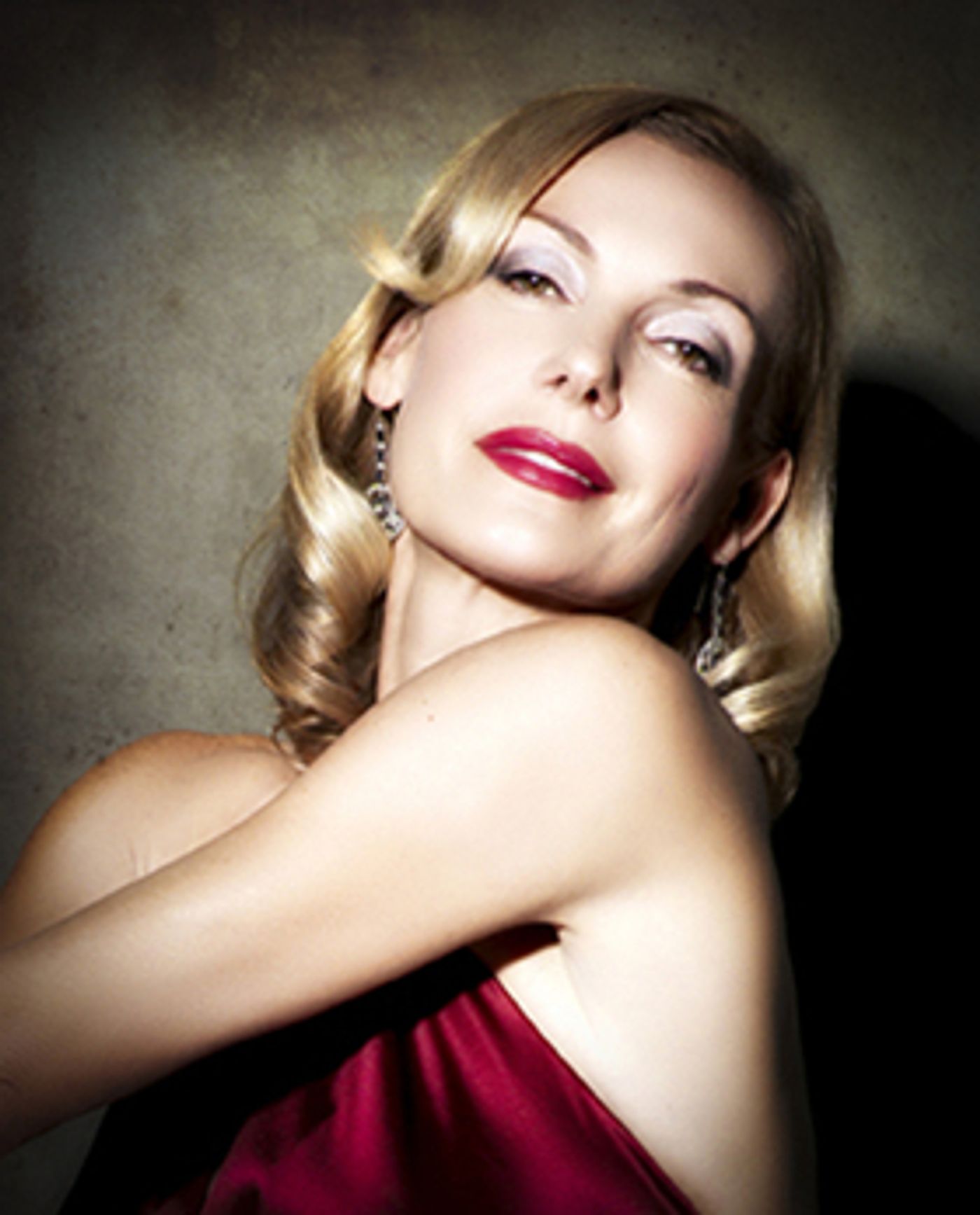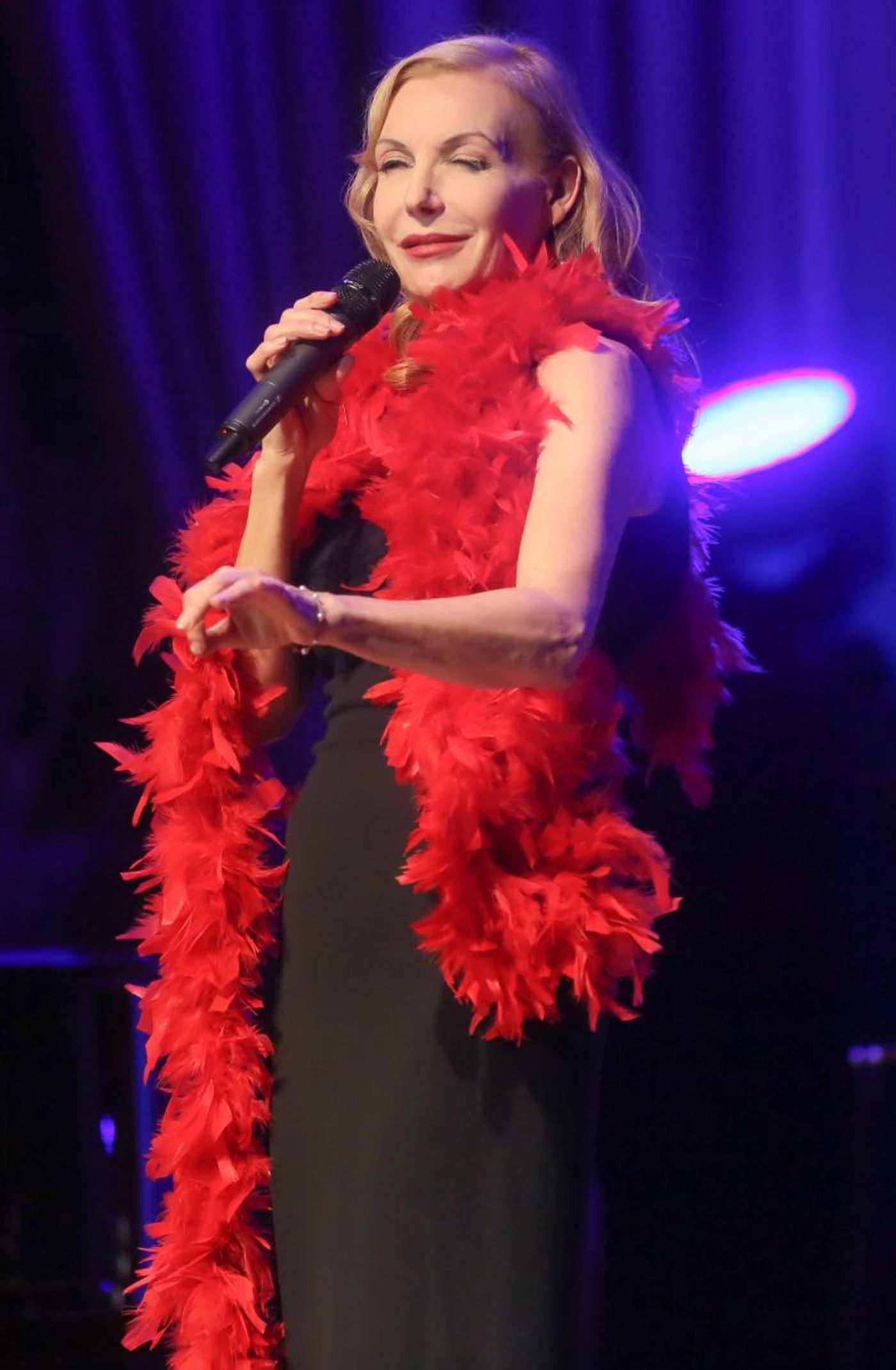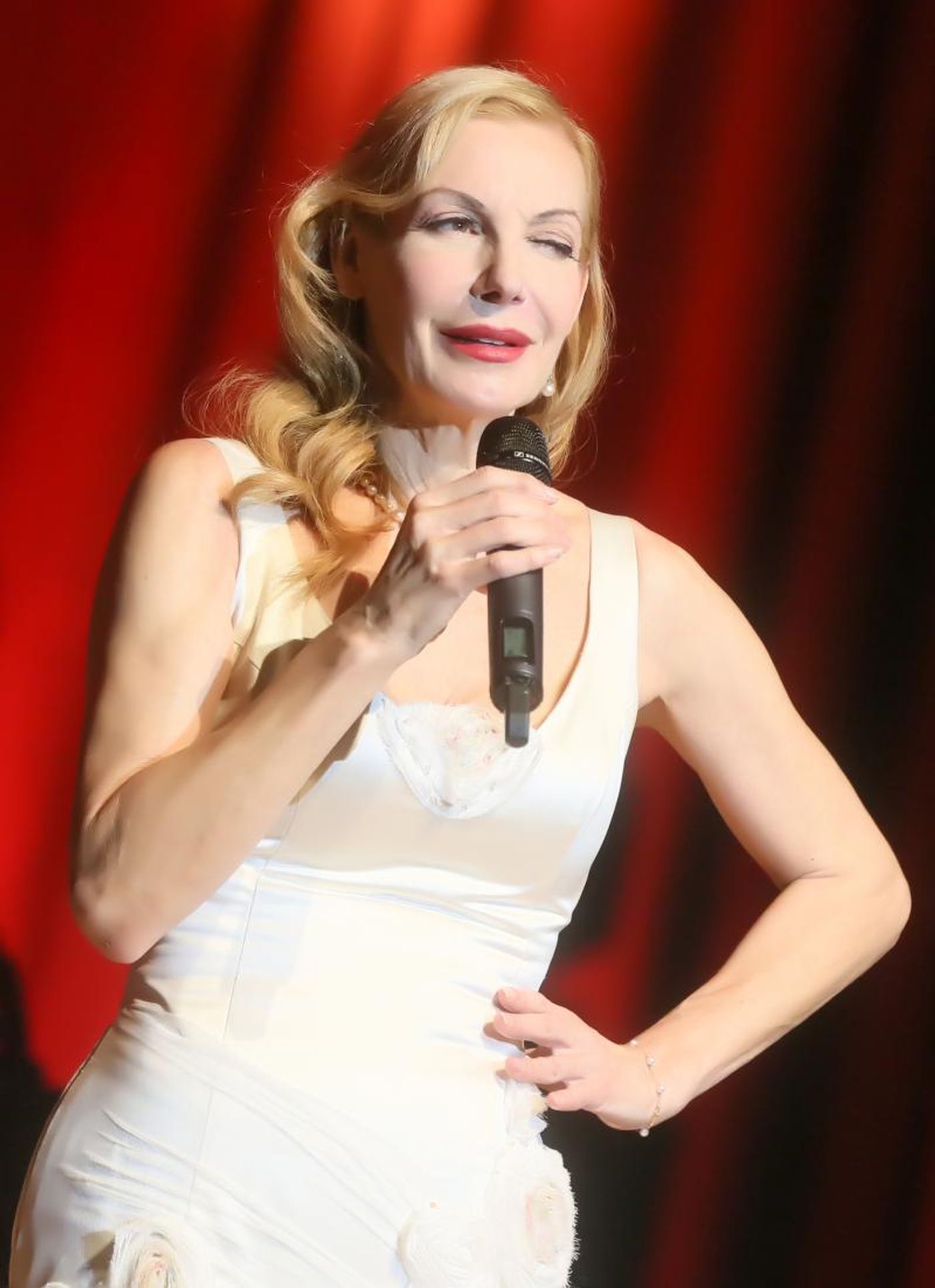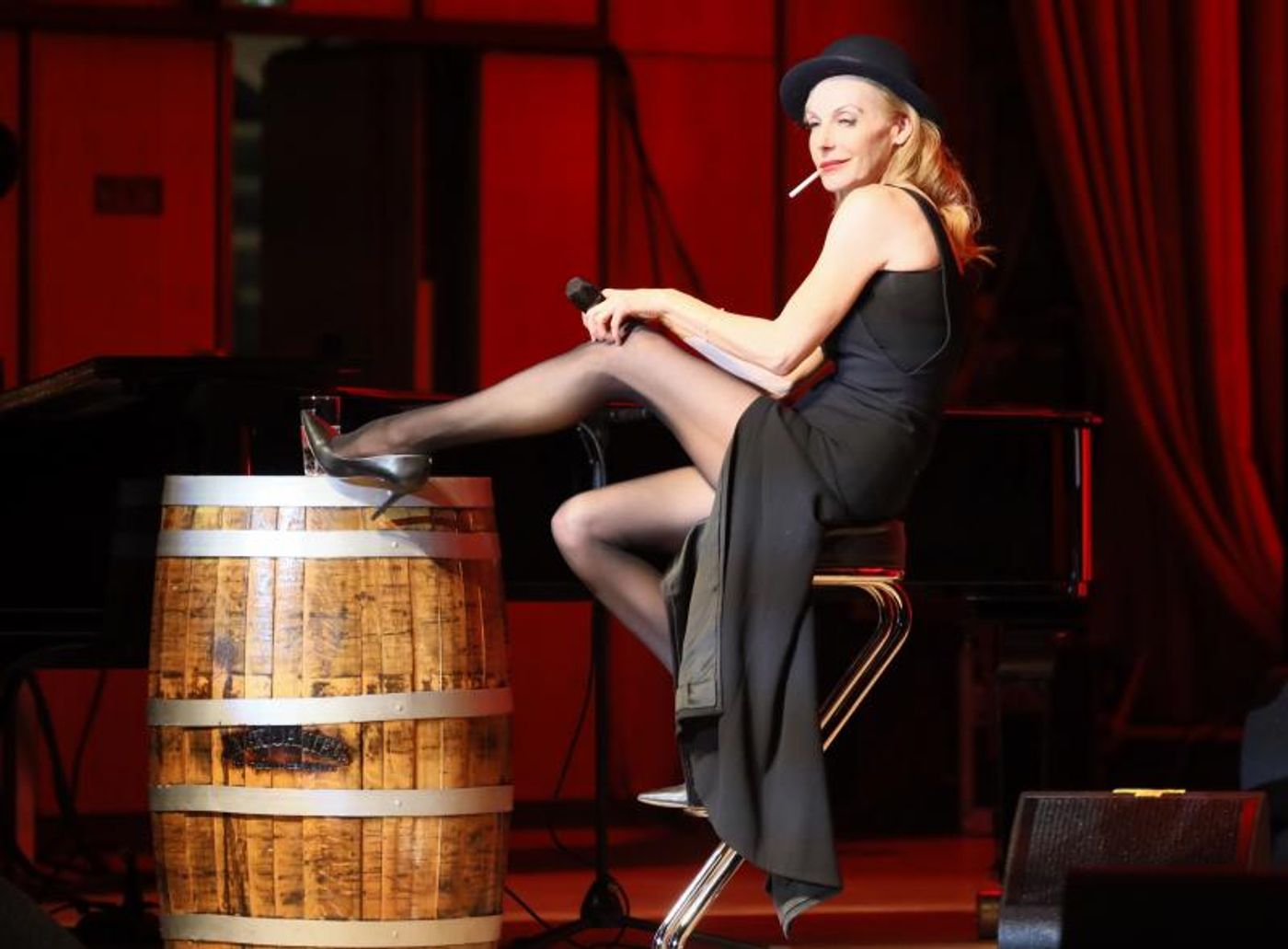Interview: Ute Lemper Talks RENDEZVOUS WITH MARLENE at the Arcola Theatre

Rendezvous with Marlene is based on a three-hour phone call between Dietrich and Ute Lemper in 1988. Ute was just at the beginning of her career in theatre and music, whereas Marlene looked back on a long, fulfilled life of movies, music, incredible collaborations, love stories and stardom.
BWW talks to Ute Lemper about her life and work, and the influence of Marlene.
If I think of someone like Dionne Warwick, she "sings" the songs of Burt Bacharach, whereas you "interpret" the songs of Kurt Weill - what is the difference (if any)?
I sang with Dionne Warwick last year at the Life Ball in Vienna! Every June, there's a huge outdoor festival in front of the Town Hall to support AIDS research. Charlize Theron and Elton John are supporters, as are the big foundations. I was in the show to sing a Dietrich song and Dionne sang "What The World Needs Now" with her daughter.
I don't know whether you can say that Dionne Warwick "just" sings the songs - she sings them for the composer, who has a certain vision and she fulfilled it. It was the 60s and 70s, so there was a whole different style.
With [Bertholt] Brecht and Weill, it's a whole different universe because the songs are meant to educate, to warn, to shake up, to provoke, to challenge the listener. It's not about singing the music in the most beautiful way - it's about making a statement that should change a person's life. That's the purpose of Brecht, to change whatever is not right.
It doesn't matter if you sing the note right, it matters if it is authentic. That it comes from the intellect, the spirit. You represent the thought of the lyricist.
Of course, you have the beautiful music of Kurt Weill at the same time. But that's why the collaboration lasted only four years. It's impossible to have the composer that strove for beauty and complexity in his music, but also had to submit to the thought of the strong lyricist (poet in this case). Brecht and Weill's competition could not last.
It was magical for a short time - The Threepenny Opera and The Mahagonny Songspiel and the last collaboration, The Seven Deadly Sins. Brecht had to be a total poet and that meant that the music had to submit completely to his words.

Rendezvous with Marlene
The Art of the Weimar is transgressive, challenging behavioural norms, and has an urgency to it, a sense that their world was coming to an end. How do you locate The Weimar looking back almost 100 years?
The Weimar had many chapters. The rise, the freedom of expression and glory and then the decline and its shattering by the Nazis. At its prime, it didn't feel like it would fall - say 1928 and The Threepenny Opera. After 1930, we have the fear of Nazis.
It was an incredible time. One would have to speak to the people who lived through it, but it seems to have been the most advanced and progressive culture in Europe. The freedom enjoyed by artists is unsurpassed, even today, because artists must comply with the market and commerciality.
Since American art conquered the world, art is a commercial institution. In Europe, we have way more possibilities to create subversive art, but much of it is subject to commercial imperatives. That's how music is produced, that's how architecture is produced - for the purpose of selling well.
The Weimar, growing in the follow-up of World War I with the Kaiser in exile, was the first instance of democracy in Germany. The intellectual spirit, the emancipation of women, the Bauhaus, the architecture and journalism had reached this state of wanting to reflect reality and not beautify it. Even the French and Austrians wanted to beautify things - but not in Berlin. That realism was what people needed to confront their times - it was at the cutting edge of art.
It's incredible to imagine what would have happened had the Nazis not come to power and that culture had survived. We would have reached "the 60s" so much faster - maybe in 1935! Liberation wouldn't have come from San Francisco, but from the middle of Europe.

Your career has always had one foot in the commercial world and one in what might be called "high culture" - is there a real difference?
I don't think about that too much.
My few high-profile commercial journeys on Broadway or in the West End or in movies were always looked at closely by the audience, but they were the least fun. I had to compromise my artistic liberty and I struggled horribly having to do the same thing night after night, even if the parts were great - Sally Bowles in Cabaret was certainly a great part to play!
The fact that it's eight shows a week in the commercial machine was a killer to me. I enjoyed parts of it, but it was not my most happy time. I got awards, but I wondered what it meant - I just had to get through it, to deliver (and not create) every day.
My happiest times are when I am just in my room, creating something new out of nothing. My last 15 years have been dedicated mostly to that, since I started writing music and creating projects. I have a thought, follow it through, build a storyline, make it into music and then bring it to life. It's always completely authentic that way.
It started with the Charles Bukowski project in New York and then the Pablo Neruda project that sparked the Paulo Coelho work that I so enjoyed writing. I worked with fabulous collaborators. I loved my project prior to the Marlene one, Songs for Eternity, the music written in the ghettos and concentration camps. There was a mission behind that of course.
Everything happened out of instinct or momentary inspirations - people I meet or books I've read. It's the same for the newest project, the Marlene show.

You were a big star on stage and screen and yet you waited a long time to bring forth your own creativity.
It wasn't the right time. And I literally didn't have time, because of commitments that capture you in productions - and then it's all about survival. I played Chicago in London for two and a half years - you have to preserve your voice and body. I was just a kid too!
When I stopped doing these productions, there was more time, so I found freedom again. I found my voice again. I started painting (in Berlin) , which I loved very much and then I started writing music.
Your association (in the public's mind) with Dietrich goes back 30 years - she was a German living in the USA and you are a German living in the USA. What does that feel like now?
It feels great! In New York, everyone is from everywhere and that's what I really liked about moving there 20 years ago. It didn't matter if you were German, French, British - you were immediately a New Yorker. People didn't look at your passport or stereotype you through the history of your country, you were just a free spirit living in a very progressive place, characterised by its diversity.
I did feel in London and Paris that I was stereotyped as a German - in the aftermath of World War II, there was good reason for that. But it was different in New York and I very much enjoyed that.
The heritage I have was everything - it was a burden, it was an inspiration, it was a mission, it was a task. Sometimes it was a revenge too. It is the luggage that I carry as a German, with a responsibility to keep the cultural dialogue about the past alive. I noticed that very quickly, because the first round of celebrity that came my way resulted from the international recording contract with Decca in London in 1986.
Decca suggested the "Degenerate Music" project to re-record the music banned by the Nazis. It was created by Michael Haas, a British-Viennese musicologist and I was the protagonist of the songs.
My first album came out in 1987 - "Ute Lemper Sings Kurt Weill" - I didn't know what it all meant. I just enjoyed singing the songs, but it was a very big thing. The album spent 50 weeks in the USA crossover charts at Number 1 and it was studied at every university in America. When my kids went to college they said, "Mom - all my college professors studied your Weill stuff!".
The centre of my interviews and conversations was looking back at what happened when Brecht's German poetry was set to music and what happened to Kurt Weill, the Jewish immigrant who had to leave everything behind and redefine himself as an American composer. There was so much in that typical Jewish immigration history and, of course, The Holocaust.
I was only 24 and it was a big load for a post-war German to represent, to clarify and to talk about - and I loved it. I took it to my heart and it burnt my soul. I was very scared of plane trips back then, and I had all these books with me about The Holocaust, the ghettos, the camps, the music. I really studied this time - and I felt pain about it too. It fuelled me.

Obviously, there is an artistic connection between you and Marlene, but is there a personal, a political, a social connection too?
The show is an incredible journey through her life. I go deep into history - it's not just the phone call, I did a lot of research.
She was 87 and I was 24, so I have a few very distinct memories - especially her love of the poetry of Rainer Maria Rilke. She continually recited Rilke to me - of course, I can't recall the exact quotes, so I looked for the Rilke quotes I love for the show. There's her bitterness about having lost her home - her Heimat - her Germany, but also her love for Paris and France.
But the centre of the conversation was Germany. She was melancholic, angry, bitter, sad - all of those emotions. It's an incredible story that I tell in this one evening. It's an homage to her, to her music, to the many chapters of her life.
She was a Weimar cabaret star, a Hollywood diva, an American soldier. She was exiled from Germany, had hundreds of lovers, proclaimed progressive attitudes at a time when women were not allowed to be assertive. The guys loved to hang out with her because she was not this romantic little thing, she understood life and relationships.
She seems so angry about things, even quite late in life, in her singing of songs like "Where Have All The Flowers Gone".
She did not resolve her anger - it never went away. There is a resemblance there in a certain way - she once said that her hatred for Nazi Germany is so strong that it darkened her soul and poisoned her body.
I would say that everything I ever did on stage is also fuelled by that same emotion. It did darken my soul and it is a burden, but, at the same time, a fire that burns too. I transform that into art.
All these years later, do you believe that there is an obligation to "account" for being German?
Not, not "account". I love to be a German - it's great to live and work there and the German audiences are very kind to me. There have been times when they have not been supportive, but they are now.
There is a responsibility to humanity I think, especially in times like these. That's why the Dietrich story is important nowadays, a time of populism with people trying to find old identities to do with nationalistic views. It goes from Trump to Brexit to the French Right-wing movement and the Austrian Right. Even in Germany, there are neo-Nazis. We always have to keep it in mind.
Being a New Yorker, I feel it so strongly that there is no other way for our future everywhere - we have to become what New York is today. It's a universe of of different heritages and nations, races and nationalities intertwined, bringing out a new culture that is a mosaic of different people. Those who try to hold that back and keep their blond, blue eyed or pure British, Scandinavian or whatever, well, it's never going to happen. There is only one way to go - all people coming together and moving forward.
Those hanging on to their old nationalistic identities are acting in desperation, afraid to lose something that once defined their lives. It's small-minded and provincial and intolerant. It's also unrealistic - and those politicians who support such views are manipulating the people.
You phoned Marlene?
No. I sent her a letter, I didn't expect an answer and she phoned me.
I knew she was a recluse at that time, but she was aware of what was going on. She was bright and interested, opinionated and probably a heck of a bitch! She had no censor, no filter - she just said what she thought.
The letter had expressed my admiration and congratulated her for this incredible life she had. I told her what she meant to me and apologised for the comparisons being drawn. I guess she thought the letter was interesting and respectful and she phoned me.
Why has it taken 30 years for this conversation to come to artistic fruition?
The show I have created has me crawling into her skin. It's important to be older - I can feel it more than ever before in my life. The years of being a performer, out there, but also enjoying the anonymity of being reclusive. I feel her much more than ever before.
The Berlin Wall is down now - 30 years, I can't believe it!
It feels like the right time. Last year, I was reading two different scripts, plays where I was asked to perform Marlene Dietrich. I thought it was horribly written, she wasn't like this stereotype that any Drag Queen could play. It was a caricature, not researched properly at all, showing none of the pain that she carried around.
I fed the scriptwriters more and they took it because they were not doing their own research. So I thought that I should just write my own play.
What if you get a call from a 24-year-old saying that she's being compared to Ute Lemper - how does that conversation go?
I'm not 87 yet! So maybe we'll have to wait a bit!
I'm always very generous with younger people getting into the job. There's not much you can say, because the person has to go on that journey themselves. Only he or she can find it through the years, the moments of chaos and the moments of clarity.
But you can always be generous. I'm a mother, so I know how to speak to younger people. I see it with my own children. I have thrown them into this life and I hope they can appreciate it and love it, with all the struggles that come along with it.
Sometimes I feel bad - my oldest is 25 - there's the whole hardship of love and relationships and work and society and loneliness. It's quite a thing to throw somebody out there. I hope they find their way - and I'm always there for them. And that's how I feel about young performers.
Ute Lemper: Rendezvous with Marlene is at the Arcola Theatre 14-19 May.
Photos Lucas Allen, David Andrako, Brigitte Dummer
Videos

